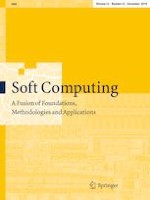28.01.2019 | Methodologies and Application
A model for two-stage fixed charge transportation problem with multiple objectives and fuzzy linguistic preferences
Erschienen in: Soft Computing | Ausgabe 23/2019
EinloggenAktivieren Sie unsere intelligente Suche, um passende Fachinhalte oder Patente zu finden.
Wählen Sie Textabschnitte aus um mit Künstlicher Intelligenz passenden Patente zu finden. powered by
Markieren Sie Textabschnitte, um KI-gestützt weitere passende Inhalte zu finden. powered by
